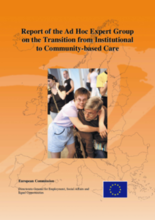This Report was drafted by a group of independent experts convened by Commissioner of the European Commission, Vladimír Špidla, in February 2009 to address the issues of institutional care reform in their complexity.
Executive summary
Many people of all ages and different conditions (elderly, children, persons with disabilities – including persons with mental health problems) live in residential institutions which tend to segregate them from the community. For the purposes of this report, these institutions are not defined primarily by their size but above all by features of “institutional culture” (depersonalisation, rigidity of routine, block treatment, social distance, paternalism). Size is merely an indicator - the larger the setting, the fewer the chances are to guarantee individualised, needs-tailored services as well as participation and inclusion in the community.
The actual number of persons in institutional care is difficult to ascertain due to the lack of available data, but it is certainly in the millions. In some Member States institutional care still accounts for more than half of public care expenditure. This model predominates above all in Central and Eastern Europe. Due to population ageing, the numbers of persons requiring some form of long-term care are set to grow steadily over the next decades.
There is strong evidence in support of transition from institutional care to community-based alternatives (deinstitutionalisation). These can provide better results for users, their families and the staff while their costs are comparable to those of institutional care if the comparison is made on the basis of comparable needs of residents and comparable quality of care. The current economic crisis should thus not be seen as a reason to delay existing or planned processes of deinstitutionalisation. Costly improvements in the physical conditions of existing institutions, which are often proposed as a response to findings of substandard care, are also problematic because they fail to change the institutional culture and make it more difficult to close these institutions in the long term.
Several key challenges of deinstitutionalisation processes have been identified. These include the replication of institutional culture in community-based services and the long-term persistence of parallel services (failure to close the institution). Conversely, there is a risk of failure to create appropriate community-based services due to unrealistic targets and timetables which exceed the capacity for their development. This is particularly likely to happen when deinstitutionalisation is seen mainly as a cost-cutting exercise.
A set of Common Basic Principles has been drawn from best practices in this area as well as from the evaluation of key challenges mentioned above. In general, the process must respect users' rights, and users have to be involved in all decision-making processes. There has to be a holistic system of prevention of placement into institutions. Community-based services must be created in parallel with the closure of the institutions. The process requires sufficient and well-trained staff with skills appropriate for community-based care as well as adequate support to families. Both the transition process and the resulting services need quality control with a clear focus on user satisfaction. Continuous awareness-raising is necessary.
The report addresses recommendations to Member States which have the main responsibility for action in this area. They should guarantee that users are fully informed and actively involved in decision-making processes; review legislative and administrative rules which directly or indirectly support institutionalisation and change them; adopt strategies and action plans based on the Common Basic Principles; use EU Structural Funds for this purpose; establish systems of mandatory quality monitoring related to the quality of life of the users; promote improved working conditions of professional carers and provide systematic support to informal ones etc. Last but not least, they should ensure vertical and horizontal coordination of different authorities and agencies involved in the transition process.
Finally, the report also makes recommendations to the European Commission, namely to present a Communication on the transition from institutional to community-based care; to build the Common Basic Principles into all the relevant EU policies; to provide guidelines on the use of EU Structural Funds and other funding instruments for deinstitutionalisation; to promote and facilitate exchange of models of good practice in this area; to establish a pool of independent experts on the issue; to improve the knowledge base by defining a minimum data set for residential services; to fund research in this area; to raise the issue of investing into community-based care in the debate on the future of Cohesion Policy after 2013; and to raise awareness of the issue within the Commission itself.

